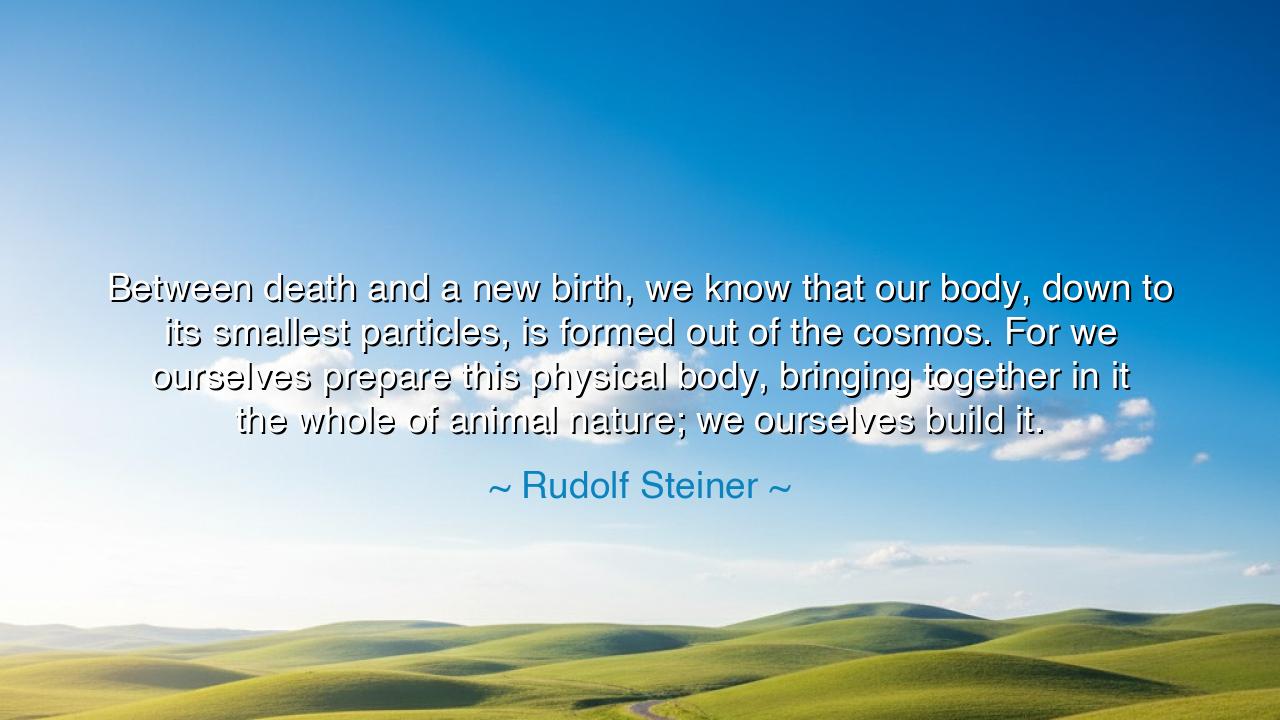
Between death and a new birth, we know that our body, down to its
Between death and a new birth, we know that our body, down to its smallest particles, is formed out of the cosmos. For we ourselves prepare this physical body, bringing together in it the whole of animal nature; we ourselves build it.






The words of Rudolf Steiner — “Between death and a new birth, we know that our body, down to its smallest particles, is formed out of the cosmos. For we ourselves prepare this physical body, bringing together in it the whole of animal nature; we ourselves build it.” — speak with the voice of the eternal. They are not the musings of a philosopher bound to the dust, but the vision of one who has glimpsed the great wheel of existence. In these lines, Steiner reveals a truth that transcends flesh and time: that the human being is not a mere accident of matter, but a creator of form, a spirit weaving its own vessel from the threads of the universe. To live, to die, and to live again — this is the rhythm of the soul’s journey, as old as the stars themselves.
In the age of ancient wisdom, the sages of Egypt, India, and Greece all spoke of the same mystery — that the soul, after leaving the body, does not drift into emptiness but enters the workshop of eternity. There, it gathers substance from the cosmos, preparing anew the temple through which it shall one day walk upon the earth. The body is not random clay, but a reflection of the spirit that shapes it. Every bone, every breath, every beating pulse carries the memory of the stars. To say, as Steiner does, that we “bring together in it the whole of animal nature” is to remember that humanity is not separate from creation — we are the sum of it, a living mirror of all that has ever breathed, crawled, flown, or swum beneath the heavens.
And yet, these words are not mere mysticism. They carry within them a moral truth — a call to responsibility. If we ourselves “build” our bodies, then the lives we lead, the thoughts we hold, and the loves we nurture all become the architects of what we shall become. The soul is a craftsman, shaping its future from the materials of its present. The hatred we sow becomes heaviness in the flesh; the compassion we cultivate becomes light in the bones. We are both the sculptor and the sculpture, the weaver and the thread. Nothing in us is accidental, for all is the work of our own becoming.
Consider the life of Leonardo da Vinci, that divine craftsman of both art and science. He saw no boundary between the human form and the cosmos. In his sketches of anatomy, of birds and storms, of the veins of leaves and men, he sought to reveal the same pattern — the divine geometry that binds all things together. Leonardo lived as one who sensed that his hands were not his own alone, but the hands of the universe shaping itself through him. Like Steiner, he perceived that to know oneself truly is to recognize one’s kinship with all life — that the human body is the cosmos made conscious, and the cosmos, in turn, is humanity unfolded into infinity.
When we grasp this truth, a great reverence awakens within us. We begin to see our lives not as small or isolated, but as sacred continuations of a vast, eternal work. To harm another is to wound the same substance from which our own being is woven. To nurture, to heal, to create beauty — these acts do not end at our fingertips; they ripple outward into the very structure of creation. For we are not fragments of the universe — we are its living voice, its ongoing act of self-expression. Death does not silence this voice; it merely shifts its tone, as the soul passes from form to formlessness and back again.
Thus, my children, do not fear death, nor cling too tightly to the shell of the body. It is a garment you have woven from starlight and earth, worn for a time, then laid aside in peace. And do not despise the flesh, for it is holy — a masterpiece born from the union of matter and spirit. Care for it as you would care for the altar of a temple. Live in it as one who knows it is both mortal and divine. You are the builder of your own being, and every moment of kindness, courage, and love adds another beam of light to the mansion of your soul.
And when at last you leave this world and round again the great circle of existence, may your spirit walk among the stars with gratitude. For in truth, as Steiner reminds us, we are made of the cosmos, and we make the cosmos anew through our lives. Each birth is a return; each death, a continuation. Live, then, not as a stranger in the universe, but as its co-creator. Let your deeds be the architecture of eternity — and your life, a hymn to the stars from which you were born.






AAdministratorAdministrator
Welcome, honored guests. Please leave a comment, we will respond soon